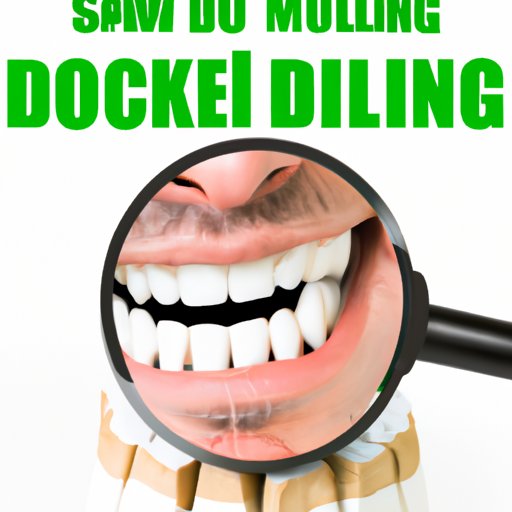
Introduction
While marijuana use is becoming increasingly popular and accepted, it’s essential to understand how it can affect different aspects of your health. One aspect that may not be talked about as often is the impact of smoking weed on your oral health. In this article, we’ll explore whether your dentist can identify that you smoke weed, and how marijuana use can affect your dental health.
This article is designed for anyone who uses marijuana and wants to understand how it affects their oral health or who has concerns about how their dentist may respond to their marijuana use.
Can Your Dentist Identify That You Smoke Weed?
When you visit your dentist, they’ll look for various signs and symptoms of oral health issues. If they suspect that you smoke weed, they may look out for specific indicators to verify their suspicions:
- Dry mouth
- Inflamed gums
- Tooth decay
These symptoms are often linked to smoking weed, primarily due to the smoke and heat exposure in the mouth when someone smokes marijuana. Your dentist may ask questions about your habits, such as if you smoke or ingest marijuana, to confirm their suspicions.
Patients have reported experiences where their dentists suspected they smoke weed and brought it up during their appointments. For example, a Reddit user posted about how their dentist had asked if they smoke weed after noticing inflamed gums during a routine exam. Another user reported that their dentist asked if they smoke weed after noticing dry mouth issues.
The Relationship Between Smoking Weed and Oral Health
There are several potential risks and consequences of smoking marijuana on dental health. One significant risk is an increased risk of gum disease due to the dry mouth that occurs when someone smokes weed. Dry mouth can lead to a lack of saliva, which can increase the risk of tooth decay and gum disease.
In addition to gum disease, smoking weed may also increase the risk of oral cancer. A study published in the Journal of the American Medical Association found a link between smoking marijuana and an increased risk of oral cancer.
Statistics from the study showed that marijuana users had a three-fold increase in the risk of oral cancer compared to non-smokers. Meanwhile, users who had smoked marijuana for ten years or more had a four-fold increase in their risk.
What Your Dentist Won’t Say About Your Marijuana Use
When visiting the dentist, patients may have concerns and misconceptions about how their dentist will respond to their marijuana use. It’s essential to note that dentists are medical professionals and are bound by patient confidentiality laws. This means that your dentist cannot disclose your marijuana use to anyone, including law enforcement.
Suppose you’re worried about how your dentist will react to your marijuana use. In that case, it’s essential to have an open and honest conversation with your dentist about it. Like any medical professional, they’re there to help you, and being transparent about your marijuana use will allow for better care and treatment.
It’s important to note that your dentist will not judge you for using marijuana. They understand that it’s becoming more popular and that it can provide medical benefits to those who need it. By being transparent with your dentist, they can provide better care and treatment tailored to your needs.
Maintaining Oral Hygiene When Using Marijuana
For those who smoke or ingest marijuana, there are several steps you can take to mitigate the negative consequences it can have on your dental health. One crucial step is staying hydrated. When smoking marijuana, dry mouth is a common side effect, and drinking water can help alleviate symptoms.
Additionally, practicing good oral hygiene, such as brushing and flossing regularly and using mouthwash, can help keep your teeth and gums healthy. It’s recommended to brush your teeth twice a day and floss at least once a day. Using mouthwash can also help kill bacteria and freshen breath.
The Ethics of Dentists Judging Patients for Marijuana Use
One significant concern patients may have when visiting the dentist is being judged or discriminated against for their marijuana use. It’s essential to note that dentists, like any medical professional, are bound by ethical codes of conduct that prohibit discrimination or biases towards their patients.
Dentists cannot assume that their patients use marijuana based on any perceived characteristics or physical signs. It’s always important to have an open and honest dialogue with your dentist about your habits and concerns, as this will ensure that you receive the best possible care and treatment.
Conclusion
While there’s no guaranteed method for dentists to identify that someone smokes weed, there are indications that they look for, such as dry mouth, inflamed gums, and tooth decay. It’s important to understand the potential risks smoking weed can have on dental health, such as an increased risk of gum disease and oral cancer.
The best way to ensure the best possible care and treatment is to have an open and honest dialogue with your dentist about your marijuana use. By being transparent, you’ll receive personalized care tailored to your needs. Maintaining good oral hygiene and staying hydrated can help mitigate some of the negative consequences of smoking weed on your dental health.




